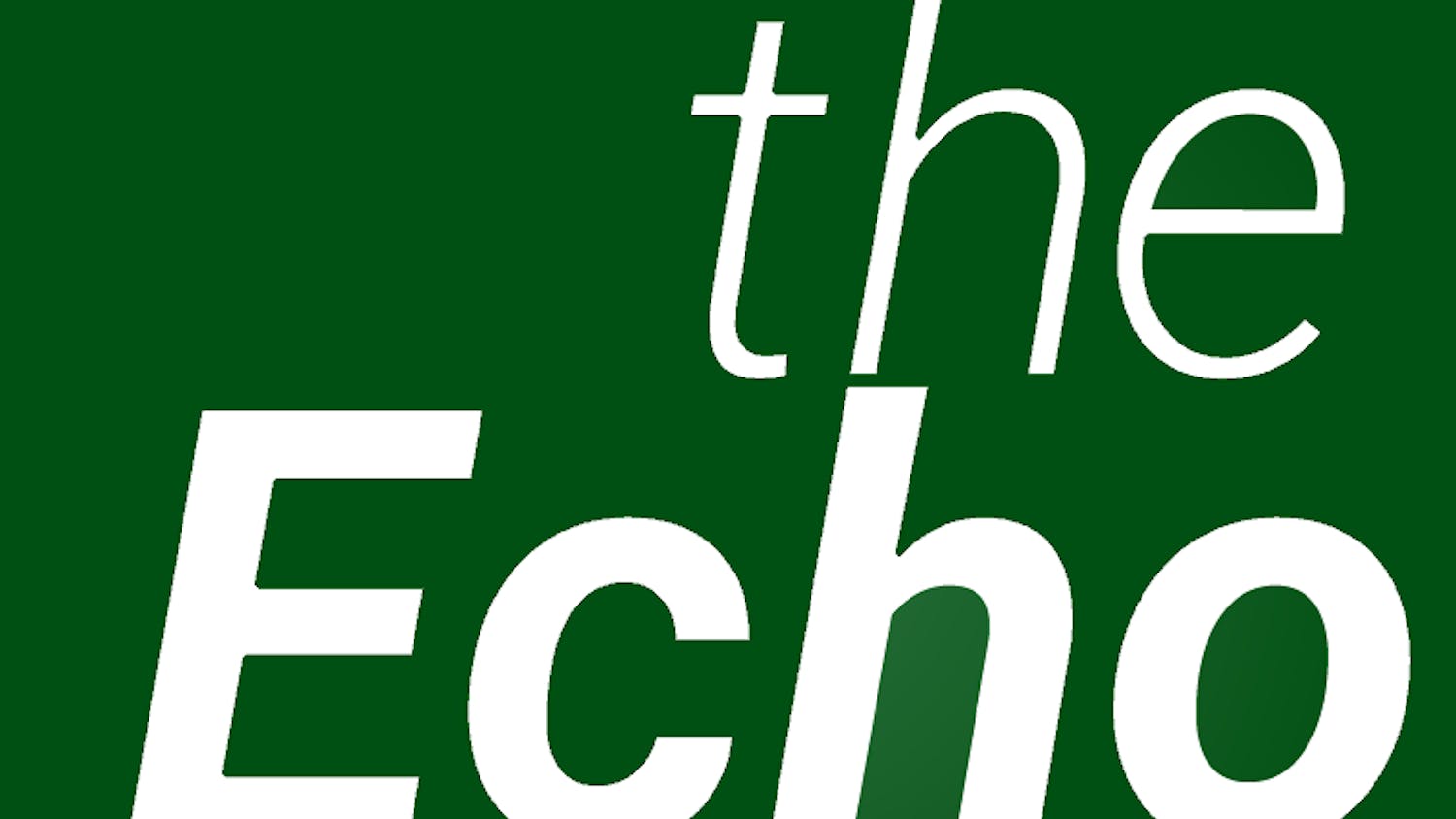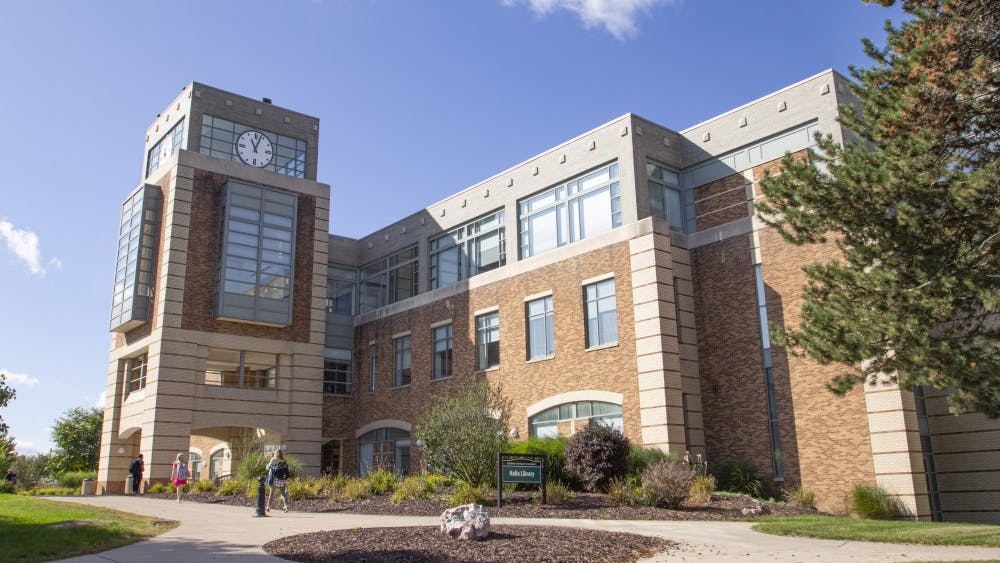Kylie Gilligan: When you hear the word Ombuds, what comes to your mind? If you’re like many Eastern Eagles, you’ve heard of the Ombuds, but you don’t really know what it means. According to Wikipedia, the word “ombuds” itself is defined as a public advocate. At Eastern Michigan University, students, faculty and staff members have access to the Ombuds’ department resources right at their fingertips. EMU’s Ombuds allows students and faculty members to have a chance to become more familiar with different policies and procedures, and help assist in a variety of concerns or questions that involve their time at the university.
Reporter Bianca Ramsey and I were able to sit down with EMU Ombuds Associate Director Julia Heck and graduate Assistant Michayla Petel to break down the job of the Ombuds and what they can do for students. I’m Kylie Gilligan, and you’re listening to the Eastern Echo Podcast
Reporter Bianca Ramsey was able to get a little one on one time with the associate director, Julia Heck. Heck worked with the Ombuds department as a graduate student and later took on a role as a case manager.
Bianca Ramsey: How long have you been a part of the EMU Ombuds department on campus?
Julia Heck: I am the associate director office of the Ombud, this would be the start of my fourth school year as the associate director.
Ramsey: What was your personal goal, when you arrived at the department of the Ombuds?
Heck: I think there’s couple of goals that I’ve had with the office. One is that our office can help students navigate the institutional environment. If they’re running into any problems, issues, have concerns or complaints, then we can really help them figure out how to approach that situation with the goal in mind of trying to figure out how we can find a resolution to that issue. Our ability to make sure that students are informed of policies, that they know what processes are available to them in addressing an issue, that we can connect them to the right department or offices on campus, to get an issue addressed - so really making sure that students understand what’s available to them. But for us to kind come up with that plan and brainstorm what that could look like.
And to talk through that issue. Maybe it’s just that you need to have space. Like, “How do I approach this conversation? I’m not sure what to say,” or, “What questions do I ask?”, or, “How do I frame this complaint or concern in the right way?” So being able to practice those conversations, talk through those pieces to come up with what that could look like.
And then in turn, not just one-on-one with students, but part of the work our office does is take all of that conversation as a whole with students, and then form that into - Are we seeing any trends? Are there common issues or concerns that we’re seeing? And then create feedback that we give to the institutions - recommendations, suggestions, information that will help them. And maybe they need to revise policy, or we need to look at culture change. How can we improve the institutional environment to help students be able to navigate that space easier?
Ramsey: Have EMU Students used this department as a resource center?
Heck: On average we probably have between 450 and 500 students to come chat with our office each year. It really kind of depends on what the trends are with students too. What are their experiences across campus?
I would say that over the last four years, it has definitely increased. But I think it’s also been because our office has tried to do some outreach. So we’ve done things like working with The Echo, and having some articles written about our office. We’ve also started trying to participate in fast track and new student orientation so that incoming freshmen can get to know that we’re a resource here and available for them on campus. We started to participate and go to different areas on campus. So we actually met with admissions so that the tour guides know about us and can talk about our office. We meet with a lot of departments across campus and have done trainings with a lot of departments on campus. So like Service EMU - we met with them to talk about, “Here’s what our office does.” So if students come and disclose information to them about experiences they’re having, they can send those to us.
So we do a lot of work with departments on campus too. And so I think that’s helped - where faculty members and staff are starting to say, “Hey I think we should go talk to the office of the Ombuds.” So I think that visibility has definitely increased the amount of students who are reaching out to us.
Ramsey: What are some trending issues you’ve seen within EMU students on campus?
Heck: In general, the student classroom experience is something that we have lots of conversations about. I think, in part, it’s because if you think about your K-12 experience, it’s very different from your college experience. It’s kind of structured in a way that’s very different. You might have five classes, but each of your instructors teach different, each of your assignments are set up differently, and so that can be quite a transition for students. You have different policies in classes, and how do you adjust to those things?
And so we have a lot of conversations with students around that classroom experience. Maybe they’re really struggling to figure out how to best communicate with their faculty member, or how to best adjust to the teaching style, or they want to be able to express concerns they have about course material or anything like that. And so we do a lot of work around, “How can you approach this conversation? How might you be able to ask that question in a way that’s going to get you the information that you need, but not create a conflict there?” So we have lots of conversations around that classroom experience, grading, different pieces that relate to academics.
I would say we have a significant number of conversations that are just around policies and processes in general. It can be challenging to kind of know all the things that you need to know as a student and what’s available to you. Maybe you need to withdraw from classes, or you want to look at doing appeal or grievance related to various topics. And so helping students navigate those policies and understand how to submit the right things, or when dates and deadlines are is another big piece that we do.
The third area that’s the biggest area of trend that we’re seeing is just student well-being in general. Maybe you’ve had some sort of medical issue or personal circumstance that’s happened that’s outside of your classroom experience, but it’s impacting you here as a student. And so meeting students to talk about, “What are your options? What support do you need? How can we try and figure out how to get you in the best direction, and make sure that you know what’s available to you?”
Ramsey: Has the Ombuds department ever collaborated with other departments across Eastern Michigan’s campus?
Heck: We do our best to collaborate with a number of departments across campus. For us, it’s about really helping take that student experience and work with the institution. We refer a lot of students to CAPS. We’ll reach out to kind of understand what resources are available from their staff. Their staff know our office as a resource to students, and so they might be working with a student and say, “Hey, you’re going through all these things. There might be a policy or process that you could go through. Maybe go meet with them to talk through those options.”
But a number of departments - Our Wellness and Community Responsibility Office, we’ve partnered with for a while the really work through helping students understand their rights as a student. In particular, around the Code of Community Responsibility. The transitions that that office has [gone] through in terms of addressing student concerns that were expressed, to now, what they look at as their process or how they’ve made revisions to the code. So we work with a lot of departments on policy improvement. Maybe they want to get our feedback on, “Okay, you’ve shared with us here the student concerns. We went back and tried to rewrite some things. Can we get your feedback on it now?”
So really kind of across the board. Our main goal is, how can we make sure that partners know our office, and know that, when a student comes and shares concerns, to direct them to us so we can help them figure out where to go. But then, also, how are we providing that feedback to the institution and really creating meaningful spaces to help address that student experience?
Ramsey: In addition to Julia Heck, Michayla Petel, the graduate assistant on staff, also works directly with students and faculty who come to the Ombuds office for guidance. Reporter Kylie Gilligan spoke with Petel to gain more insight into exactly what students can expect during a visit.
Michayla Petel: [I] basically work with students. They make appointments Monday through Friday 8 a.m. to 5 p.m. They can come in and talk about whatever issues that they have. A lot of them being late withdrawal tuition appeals, grade grievances, even instructor conflicts. They come in and they talk to us and we try to work through that with them, and just encourage constructive conversations with the professors, depending on what’s going on and help them out and guide them in any way that we can. Provide them with on-campus, even off-campus, resources that may be helpful for their situation and just kind of directing them to whatever resource would be best for them.
Ramsey: However, Michayla explains that the customer isn’t always right. She serves as more of a mediator between two sides.
Petel: Our really big mission or message of our office is that we’re neutral and we’re completely unbiased, so as much as we advocate for the student, we also advocate for whoever else is a part of the situation or concern that they come to us about.
So, we, when students come in, for example, for an instructor conflict, we want to hear their story, we want to hear what’s going on. But then we also really work with student outreach. We reach out to the professor and ask, “What’s going on with this student? What can you provide? What information can you provide that will better help us assist the student?” So we really want to make sure that we’re advocating for the student, but we’re also taking into consideration other perspectives. Some people might see that as a limitation when they come in. They’re like, “Well, well, how can you help me specifically?” but I’m like, “I need to hear the other perspective.
Ramsey: Some students may want to remain anonymous. In this case there are steps the Ombuds can take in an attempt to honor that request.
Petel: In some cases, we do have to mention the student, but if they want to remain anonymous then we relay to them that, “Okay, this is all that we can do for you if you want to remain anonymous. If you do open up and you allow us to mention your name to the professor, then there [are] more things that we can do.” But, ultimately, it’s their decision if they want it to remain confidential and we have to abide by that.
Ramsey: Some students may hold the misconception that the Ombuds is a “quick fix” to a complicated problem. But Michayla explains that there is more to it than just that.
Petel: So, I’d say grade grievances are kind of the biggest thing. And that would occur when a student, after the semester is over, receives a grade that they feel that they were graded unfairly for. And there is kind of a wide range of criteria for that specific process. Graded unfairly means- It’s not where, you know, “I asked for an extension on a project and they didn’t give me the extension.” It’s more along the lines of, “I feel like maybe I was discriminated against [by] this professor. This is why.”
We really ask for supporting documentation, so in that case, we would need some sort of evidence, I guess, that says why this person might have [felt] this way and how this supporting documentation validates that feeling. That is then presented to a committee, and they look at that full, all of that documentation, that they provide, and they decide if the grade that was received was given unfairly. And then the office of the Ombuds is completely unaffiliated with that committee, so we don’t have any word or power against this decision. But the committee has the ability to approve or deny the decision in the case that it is, or was, graded unfairly. Then the committee and the professor work together to decide a grade that is fair for the student. So it’s a great resource-- a lot of students utilize that resource.
Another one is late withdrawal tuition appeals, which I definitely think is important to note if students don’t know about it. So, if they had a really tough time in the semester, issues with mental health, for example, is a really big one, and they ended up not doing great in the class they can apply for a late withdrawal. So, instead of having the grade that they ended up with in the class, they’d get a ‘w’, as a withdrawal. And then, in that same form, they can apply for tuition appeals, so they would essentially get a percentage of their tuition back based on their decision.
Again, we are unaffiliated with that committee, but that committee does have the power to decide if they approve or deny the decision, and they also have the power to decide what percentage of tuition they would grant [the student] if it was approved. But, again, supporting documentation is huge with that process, so having the medical documentation available that provides supporting evidence for what might have happened through the semester, and a statement from the student, as well just kind of explaining what was going on is, also really important in that process.
Gilligan: Do you feel like students are using this resource effectively or do you wish there was a bit more awareness?
Petel: I think that there needs to be kind of a general explanation of what we do. I definitely think that some people come to our office kind of expecting us to like wave our wand and like have all these things that are just not realistic for the power of our office. I think maintaining the idea that we are neutral and unbiased- And we really take perspectives from all sources. Having students understand that is really important.
So, I do think that students come here, most of the time, they know what we’re here for and how we can help them. But there, in a lot of our conversations, there’s a lot of times where I’m like, “Okay, I just want to kind of preface this by saying, ‘This is what we do, this is what we’re here for, these are the limitations that we have in your specific case.’” And sometimes, things are just not feasible with what students come to us for. But, no matter what, we like to end every single appointment with providing them with some sort of information or some sort of resource that can help them even in the smallest ways.
Ramsey: The Ombuds department is located on the second floor of the student center, room 248. The office hours for the Fall and Winter semesters are 9 a.m. - 5 p.m., Monday - Friday. The Ombuds is available to all EMU students and faculty members by appointment, which can be made by calling the office at 734-487-0074.
Gilligan: The Ombuds office can provide problem-solving opportunities and are available to discuss any concerns or problems you may face on campus. If you would like more information about the Ombuds, go to www.emich.edu/ombuds.
The Eastern Echo podcast is produced by Rylee Barnsdale. This episode was written by Kylie Gilligan and Bianca Ramsey.










